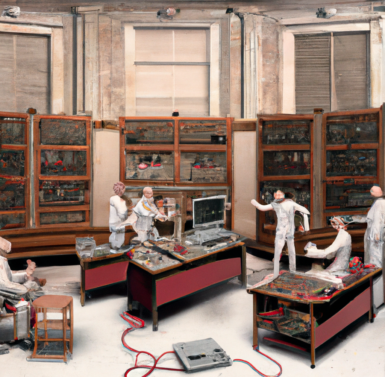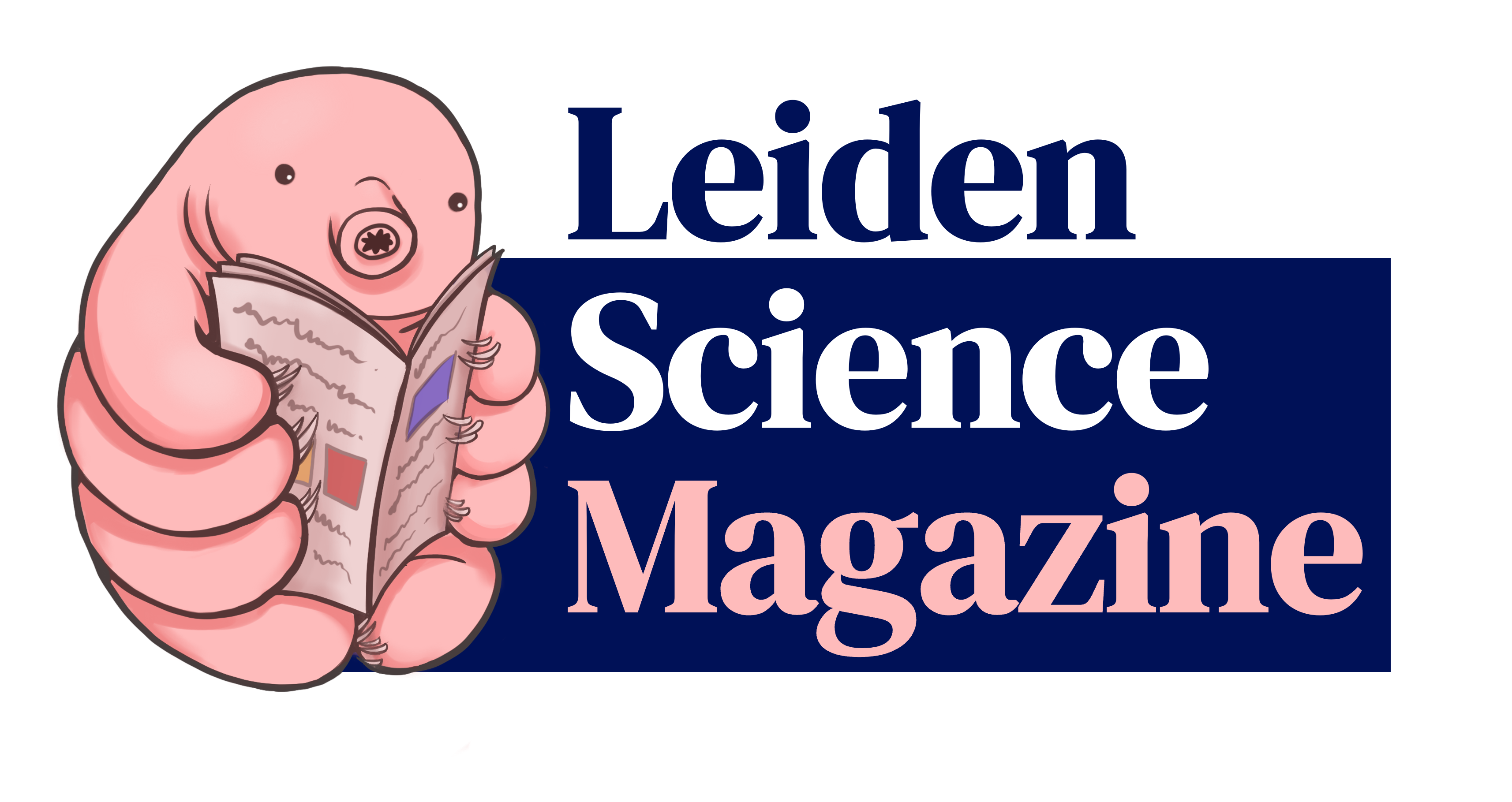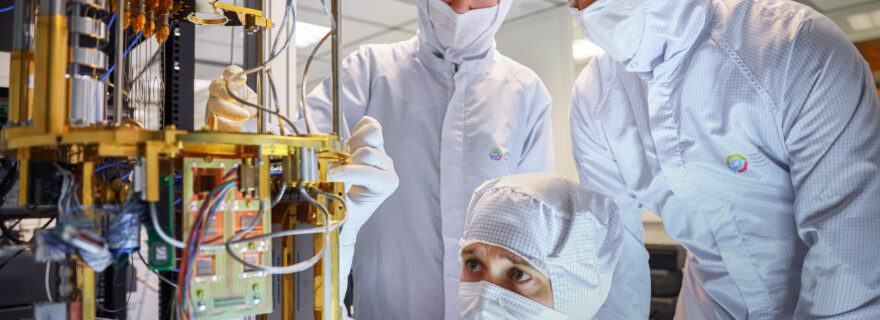Quantum in society: what is the future?
Recently, two students organised a discussion evening on Quantum & Society. In this article, I offer you some of the information shared that night. As discussion is obviously an important part of a discussion night, I will also share some of the questions and opinions that came up.
Quantum computers
The first of three speakers was Florian Unseld, researcher at QuTech. He focused mainly on quantum computers: how do they differ from current computers, and what could be the consequences? Florian kicked off the night with a little game: can you recognise the quantum computer? A few confusing images later, we got a crash course on quantum computing. If you’re interested in the theory I’d recommend studying physics, but to summarise quickly: a normal computer has bits, which have a value of either 1 or 0. A quantum computer has qubits, their value is simultaneously 1 and 0. The most confusing thing about this, is that the state a qubit is in, is decided the moment you measure it. And the cherry on top? If you know the state of one qubit, you know the state of its counterpart, even if the two are on opposite sides of the universe.
A great benefit of quantum computing is that it is more secure, because it can generate truly random numbers, thus creating safer encryption keys. An additional pro is that quantum computers are much faster than normal ones. But every upside has a downside, which in this case is that quantum computers are only good at complicated calculations. Ask a quantum computer what is two times six, and the high error rate will result in a number of different answers. When you get to the more complicated calculations, however, the quantum computer beats the ordinary one. What would take your Acer thousands of years, the quantum computer does in seconds.
The talk was followed by a discussion, which focused on the future of quantum computers. A few attendees wondered if we should be scared of what quantum computers might end up being capable of. Would we be able to control a quantum AI? And how will quantum computers work in the future? Not all of these questions have a clear answer but in the collective conclusion, Florian said we can rest assured that we have no reason to fear quantum computers.

The second quantum revolution
The second speaker was Frans van Lunteren, professor in history of natural sciences. His talk was centred around the history of physics and the changes in appreciation of certain fields. He took us through a whirlwind history lesson, beginning in the 1950s. All those years ago, there was great optimism over atomic energy. It was thought to be a cheap and abundant power source, meaning there would never again be an energy crisis. From there, we took a great leap to the '90s with the Human Genome Project and how it would improve medicine. The connection between these two? They seemed like a great new beginning and turned out to be a disappointment. ‘So far, [the HGP] has extended life expectancy by only a few seconds,’ Frans said. These examples show that great expectations do not guarantee great results.
Next, we were told about two physicists, John Clauser and Alain Aspect. Clauser’s experiments confirmed predictions about quantum mechanics, but he was ignored as many doubted if his research was ‘real physics’. Aspect performed an improved version of Clauser’s experiment and said that ‘most physicists thought I was a crackpot.’ But what do these two have in common? Alongside Anton Zeilinger, they won the Nobel Prize in Physics 2022.
So what should we invest in? Theoretical or experimental? The immediately practical or the surprisingly interesting? What research will be the future? It is after all impossible to predict what research will turn into a success.
One of the attendees said that "pure science" barely receives any funding, and wanted to know what the speaker thought about this. Van Lunteren responded that pure science is important for multiple reasons. First, exploring the universe will also help us explore ourselves and satisfy our curiosity. Second, the pure science of the past has an immense influence on our daily life now. No GPS could work without relativity. And lasers are everywhere, from cat toys to laser shows.
The second question from the audience was: ‘Will we ever know all of basic science?’ The answer to that is no. Every so often, approximately every century, we think that we know everything. But we never do.

Quantum Technology 2.0
The third and final speaker was Bart Karstens, researcher at the Rathenau Institute. His lecture considered quantum development from different perspectives, primarily technology and societal applications.
He described the "Janus face" of technology: all technology can be good and bad at the same time. Take, for example, the automobile. The consideration is mobility vs safety: only after a large number of accidents in the first 20 years cars were used did anyone think to add seat belts. ‘Something has to go wrong first, before we can change it and make it better,’ Bart said. He used the simile of Neurath’s boat: you take a boat out to the ocean and fix everything as it breaks, while still on the ocean.
Next, he mentioned a few opportunities of quantum technology: computing, simulation and communication. But an important question lies in these opportunities: how will they be used? Are we heading towards universal quantum computing or will everybody do it in their own way? Currently, quantum research is being done by companies and research groups like Quantum Delta. Should the government be involved at all, either in research or regulation?
We moved on to the "dark side" of quantum technology, starting with the obvious: security. Bart took it a step further than the other speakers to increased surveillance using quantum AI and even quantum warfare with autonomous weapons. The next dark side posed very different questions. Can we trust quantum computing? Will we depend on a small group of experts to operate systems? In both the public and politics, very few people know more about quantum than what they have seen in science fiction movies.
Finally, we arrived at the subject of sustainability. The cooling required for a quantum computer costs a lot of power, but you do save on information processing. The batteries last longer and you can develop and use more efficient renewable energy. Which is more important?
For the discussion, Bart asked us to think about quantum technology from different perspectives: a scientist, a politician, an environmentalist, a "regular" citizen, et cetera. What is the most important advice you can give from this perspective?
"Intellectuals" seem to think that info-dumping will lead to people drawing the right conclusions by themselves. If the recent pandemic has taught us anything, it’s that this is not necessarily the case. Physicists, for example, tend to speak in jargon and should put more thought into making their work accessible.
When we came together for the conclusion, the first question was whether or not we should let Google or Microsoft do what they want to win the quantum race against China. Bart said that China might use quantum technology to attack, should they win the race. Big tech do have the most knowledge and money, giving them the best chance at beating China. If they do win, though, they’re the ones who reap the benefits.
Returning to the different perspectives, the final questions were about what everyone’s role is. Are you working for the benefit of society or a profit for a big company? Is exciting research more important than societal benefit? And finally, the question this night was all about: what do you think of quantum technology and its place in society?






0 Comments
Add a comment